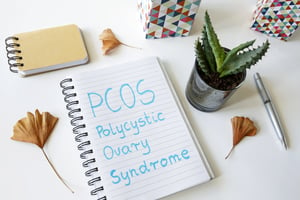 A woman’s gynecological and reproductive health can be a complicated matter. There are many conditions that impact everything from menstruation to ovulation. Sometimes it is readily obvious that a problem exists. However, in many cases, it can be quite difficult to recognize an issue that is occurring internally. PCOS, or polycystic ovary syndrome, is one of the most common conditions to affect women, and with a wide variety of possible symptoms and complications, it can be harder to recognize in some patients than in others. Here is what you should know about PCOS, from risk factors to signs and symptoms to treatment options.
A woman’s gynecological and reproductive health can be a complicated matter. There are many conditions that impact everything from menstruation to ovulation. Sometimes it is readily obvious that a problem exists. However, in many cases, it can be quite difficult to recognize an issue that is occurring internally. PCOS, or polycystic ovary syndrome, is one of the most common conditions to affect women, and with a wide variety of possible symptoms and complications, it can be harder to recognize in some patients than in others. Here is what you should know about PCOS, from risk factors to signs and symptoms to treatment options.
Who Gets PCOS?
PCOS develops from an imbalance in a woman’s reproductive hormones, causing problems such as menstrual irregularity and ovarian cysts. It occurs most commonly in women of childbearing age, between the ages of 15 and 44. Approximately 5-10% of women in this age range have the condition, although it is most frequently diagnosed in the 20s or 30s. While PCOS may be more common in those with a family history or in women who are overweight, it is largely equal across all races and ethnicities.
What are the Signs and Symptoms of PCOS?
PCOS can be difficult to pinpoint due to the wide-ranging symptoms. There are many potential signs that PCOS exists. However, the combination of these and their severity varies from one woman to the next. For patients with PCOS, the imbalance in hormones can produce symptoms such as:
- Irregular periods that may come less or more frequently than normal
- Acne, particularly in areas like the upper back, chest, and face
- Excessive hair growth in areas like the face and chin. (This symptom occurs in up to 70% of PCOS patients).
- Thinning hair
- Gaining weight or having difficulty losing weight
- Skin that darkens in areas like the neck, groin, or underneath the breasts
PCOS and Infertility?
The hormonal imbalance that accompanies PCOS is often responsible for disruption of the normal ovulation cycle. The release of eggs may be hindered or even prevented entirely, interfering with a woman’s ability to become pregnant. It is one of the most common causes of infertility. Fortunately, it is also one of the most treatable.
How can PCOS be Treated?
While there may not be a specific cure for PCOS, there are proven ways to help treat and improve the condition. Two of the most effective ways to address PCOS are:
- Weight Loss – Maintaining a healthy weight can help with hormone imbalances and insulin resistance, both potential culprits behind PCOS.
- Prescription Medication – While there isn’t a drug specific to PCOS, there are those that may be able to help. These include anti-androgens to address issues caused by overproduction of male hormones and metformin to lower levels of both insulin and androgens.
If you have symptoms of PCOS such as irregular periods or difficulty conceiving, request an appointment with a gynecologist at Lane OB/GYN. Our physicians can help you better understand what is going on with your body and find a resolution to whatever the underlying problem may be.




